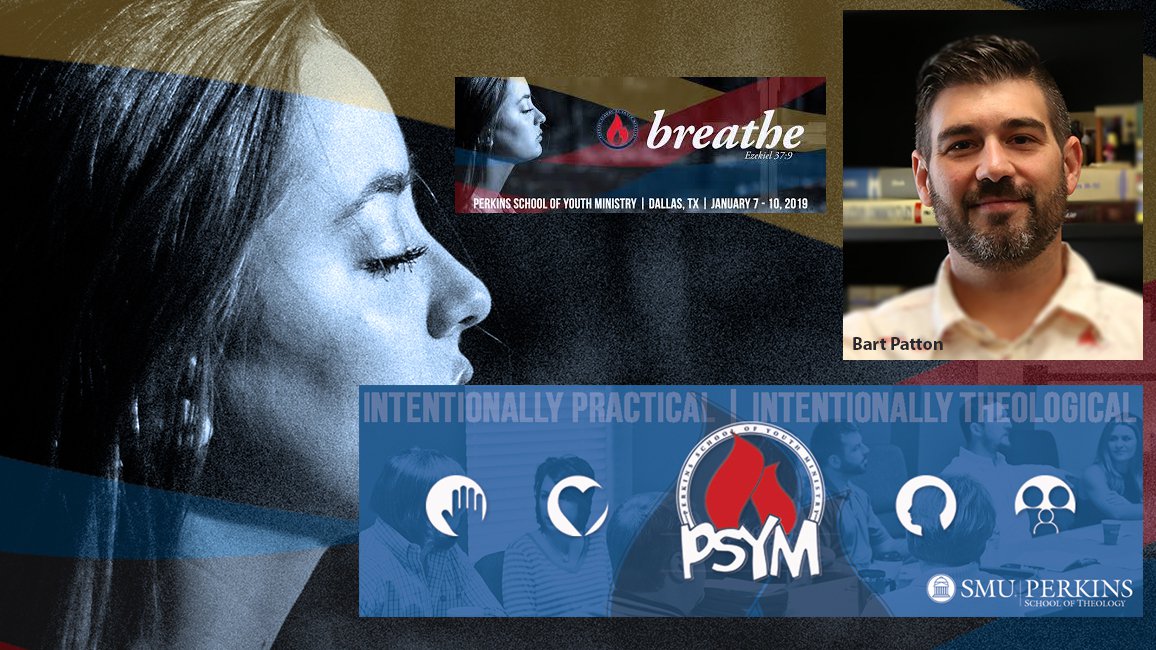Perkins School of Youth Ministry Celebrates Three Decades of Relationship-Building
Since 1988, the Perkins School of Youth Ministry has taken place each January as a way to offer a collaborative learning environment for sharing best practices and trends relating to youths in the church.
DALLAS (SMU) – Since 1988, the Perkins School of Youth Ministry has taken place each January as a way to offer a collaborative learning environment for sharing best practices and trends relating to youths in the church. Bart Patton, with more than 20 years of experience in ministry, is the director of Youth and Young Adult Ministry Education at Perkins School of Theology. He sat down for a question-and-answer session about youth ministry and what the youth ministry participants can expect at this year’s gathering.
This marks the 31st year of Perkins School of Youth Ministry. How do you believe youth ministry has changed since 1988?
There’s a lot going right with youth ministry, but there are some fundamental shifts that we must engage – the largest of which is congregation-based youth ministry. Some of these principles have been around from the beginning but got eclipsed by the professionalization of youth ministry. We are not informed any longer by a hierarchal, single-narrative vision that informs our programs or defines our successes. Youth ministry is contextual. It’s congregational. I guess I need a third “C" here. That’s easy. It’s community. And PSYM is growing to keep up with these priorities at a youth worker level. So our community of learning has never been more valuable and practical for the life of the youth worker.
“Breathe” is the theme for this year’s Perkins School of Youth Ministry. How did this come about, and what thematic aspects do you hope attendees take away from PSYM?
It’s layered with meanings. In our Design Team word-mapping activity last spring, we found ourselves stuck between a theme that could address all the craziness that we’ve seen in the last year and one that would encourage youth workers to stay focused on the ministry and work of the Holy Spirit in their youth groups and congregations. We somehow found ourselves in Ezekiel 37 – the valley of the dry bones – in which God gave the prophet the words to say to the Spirit: Come, O wind/breath of God and breathe. We knew that had captured our hopes and prayers for PSYM and felt it also captured the hearts of our youth workers for their young people – Breathe, O God on us!
So it’s about our prayer, begging the Spirit to do what only the Spirit can do. It’s also about taking a collective breath as youth workers. It’s been a crazy year. And it’s about spiritual, physical and emotional health for youth workers – Breathe. So these three ideas that come together as Breathe have informed our worship, our labs and our workshops. And, they’ve given us a prayer for our people.
What can you tell potential first-time attendees about the PSYM experience and why they should attend?
You’re going to leave refreshed and encouraged. You’re going to find a community here that you won’t find anywhere else. You’re going to leave equipped to try some new stuff. We get your world, and we’ve made a firm decision to be a grassroots youth ministry learning community that will speak to your world from the inside. Youth ministry is delightfully weird; it’s a weird job. It’s hard to find people who get that. We get it. We celebrate it. We think it’s beautiful. So, you’re going to leave with new conversation partners that understand what you do and why you do it.
Are you particularly excited about any speakers/workshop/breakout sessions?
I’m honored to partner with the Grant Halliburton Foundation to offer a workshop on mental health for youth and youth parents in faith communities. And, it’s really cool to have Russell Haitch here to lead a Science and Faith in youth ministry conversation on the heels of his work with Andy Root in the Science and Faith Templeton grant. There are so many good workshops, and they’re filling up fast!
2019 will mark your third year in charge of PSYM at Perkins. What have you learned previously that you hope to put into practice this year?
For me, PSYM is about relationships. That was true when I was student at PSYM, and it’s true now for me behind-the-scenes. I’m always working to make PSYM a place that cultivates more and better relationships with youth workers and church leaders. Sometimes, it seems like being a relational learning community and being cutting-edge are in tension. I’m always pushing myself to be more innovative in our programming. For this year, I’ve decided to let relationships win. Being in connection with each other under the umbrella of the church the way we can be at PSYM is actually counter-cultural. It’s cutting-edge in and of itself. That’s not to give up on innovation – we’ll discover innovative practices in our practical conversations with one another. Innovation is not a vertical, top-down thing; it’s horizontal, it’s one to one.
###
Perkins School of Theology, founded in 1911, is one of five official University-related schools of theology of The United Methodist Church. Degree programs include the Master of Divinity, Master of Sacred Music, Master of Theological Studies, Master of Arts in Ministry, Master of Theology, Doctor of Ministry, and Doctor of Pastoral Music as well as the Ph.D., in cooperation with The Graduate Program in Religious Studies at SMU's Dedman College of Humanities and Sciences.
